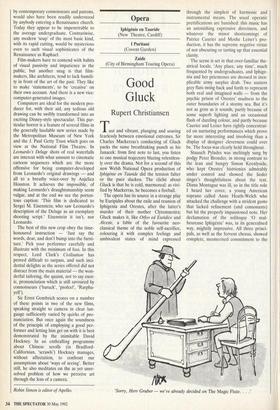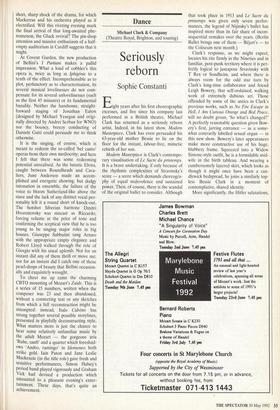Opera
I Puritani (Covent Garden) Zaide (City of Birmingham Touring Opera)
Good Gluck
Rupert Christiansen
Taut and vibrant, plunging and soaring fearlessly between emotional extremes, Sir Charles Mackerras's conducting of Gluck packs the same breathtaking punch as his Janacek: from first note to last, you listen to one musical trajectory blazing relentless- ly over the drama. Not for a second of this new Welsh National Opera production of 1phigenie en Tauride did the tension falter or the pace slacken. The cliché about Gluck is that he is cold, marmoreal: as vivi- fied by Mackerras, he becomes a fireball.
The opera has its source in a strange play by Euripides about the exile and reunion of Iphigenia and Orestes, after the latter's murder of their mother Clytemnestra; Gluck makes it, like Orfeo ed Euridice and Alceste, a fable of the favourite neo- classical theme of the noble self-sacrifice, colouring it with complex feelings and ambivalent states of mind expressed
through the simplest of harmonic and instrumental means. The usual operatic prettifications are banished: this music has an astonishing expressive directness, and whatever the minor shortcomings of Patrice Caurier and Moshe Leiser's pro- duction, it has the supreme negative virtue of not obscuring or tarting up that essential clarity.
The scene is set in that over-familiar the- atrical locale, 'Any place, any time', much frequented by undergraduates, and Iphige- nia and her priestesses are dressed in inex- plicable army surplus drab. Two austere grey flats swing back and forth to represent both real and imagined walls — from the psychic prison of Orestes' madness to the outer boundaries of a stormy sea. But it's not as grim as it sounds, partly because of some superb lighting and an occasional flash of dazzling colour, and partly because Caurier and Leiser have rightly concentrat- ed on nurturing performances which prove far more interesting and involving than a display of designer cleverness could ever be. The focus was clearly held throughout.
Staunch Pylades was meltingly sung by podgy Peter Bronder, in strong contrast to the lean and hungry Simon Keenlyside, who kept Orestes' histrionics admirably under control and showed the lieder singer's thoughtfulness about the text. Diana Montague was ill, so in the title role I heard her cover, a young American soprano called Anne Heath-Welch who attacked the challenge with a strident gusto that lacked refinement (and consonants) but hit the properly impassioned note. Her declamation of the soliloquy '0 mal- heureuse Iphigenie' was, in its generalised way, mightily impressive. All three princi- pals, as well as the fervent chorus, showed complete, mesmerised commitment to the
'Sorry, Herr Gruber — we've already decided on The Magic Flute. . .
short, sharp shock of the drama, for which Mackerras and his orchestra played as if electrified. Will this riveting evening mark the final arrival of that long-awaited phe- nomenon, the Gluck revival? The pin-drop attention and massive enthusiasm of a half- empty auditorium in Cardiff suggests that it might.
At Covent Garden, the new production of Bellini's I Puritani makes a pallid impression. What a load of cobbler's this opera is, twice as long as 1phigenie to a tenth of the effect. Incomprehensible as to plot, perfunctory as to characterisation, its several musical lovelinesses do not com- pensate for its several unlovelinesses (such as the first 45 minutes) or its fundamental banality. Neither the handsome, straight- forward staging of Jonathan Eaton (designed by Michael Yeargan and origi- nally directed by Andrei Serban for WNO) nor the bouncy, breezy conducting of Daniele Gatti could persuade me to think otherwise.
It is the singing, of course, which is meant to redeem the so-called `bel canto' operas from their own mediocrity; and here I felt that there was some redeeming potential unrealised. As the lunatic Elvira, caught between Roundheads and Cava- liers, June Anderson made an accom- plished and energetic showing, but dodgy intonation in ensemble, the failure of the voice to bloom Sutherland-like above the stave and the lack of any distinct vocal per- sonality left it a round short of knock-out. The hotshot Siberian baritone Dmitri Hvorostovsky was miscast as Riccardo, forcing volume at the price of tone and confirming the sceptical view that he is too young to be singing major roles in big houses. Giuseppe Sabbatini sang Arturo with the appropriate empty elegance and Robert Lloyd walked through the role of Giorgio with his usual aplomb. Not for an instant did any of them thrill or move me: not for an instant did I catch one of those pearl-drops of beauty that Bellini occasion- ally and exquisitely wrought.
To cheer me up came the charming CBTO mounting of Mozart's Zaide. This is a series of 15 numbers, written when the composer was 23 and then abandoned, without a connecting text or any sketches from which a full reconstruction might be attempted: instead, Italo Calvino has strung together several possible storylines, presented in playfully deconstructing style.
What matters more is just the chance to hear some relatively unfamiliar music by the adult Mozart — the gorgeous aria `Ruhe, sanft' and a quartet which foreshad- ows Andro, ramingo' in Idomeneo both strike gold. lain Paton and Jane Leslie Mackenzie (in the title role) gave fresh and sensitive performances, Simon Halsey's period band played vigorously and Graham Vick had devised a production which amounted to a pleasant evening's enter- tainment. These days, that's quite an achievement.

















































 Previous page
Previous page